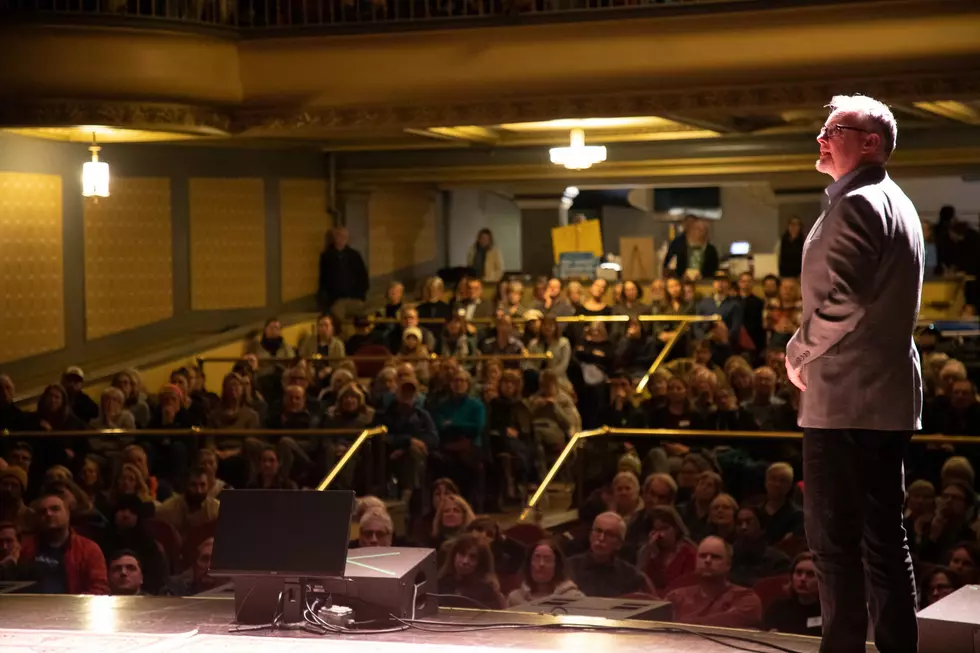
Utah physicist to Missoula: COVID challenges parallel those of climate change
In a return engagement, climate change lecturer Rob Davies urged Missoulians to act on climate change, saying the best way to do that is to talk with others one-on-one.
“If it’s possible to bring someone into the fold, it’s gotta be done,” Davies said. “If it’s not, we have to step around them. Not step on them.”
Last year, Climate Smart Missoula and other organizations brought Utah State University physicist Rob Davies to the Wilma Theater, where he explained to more than 700 people why it’s rational, not radical, to want to fight climate change.
This year, Climate Smart Missoula invited him back to discuss how the past year, with all its political and pandemic chaos, might have acted on the issues he highlighted. Instead of the Wilma stage, he appeared Wednesday night on a Zoom screen along with more than 85 attendees who signed in to hear him.
Davies reminded the audience that climate change is one piece of a larger puzzle, and all the ecological and social pieces have the same underlying pathology. The other pieces include loss of the planet’s biodiversity due to so many species going extinct in the past five decades; over-consumption of resources causing a sustainability crisis; and increasing inequity and human deprivation caused by systems that allow only two-dozen people to possess half the world’s wealth.
After this year, he’s added a fifth piece: radicalization.
He also said one of the biggest problems is population growth and the continuing emphasis on economic growth. They can’t go on forever. But they’re also the hardest issues to confront without taking on some of the other problems first, Davies said.
Davies contends it’s difficult to attain much success if people try to address these problems separately. But strides made in one area can help improve all, if they change the cultural issues at the base of the problem.
This past year saw little improvement, Davies said, with a pandemic, an economic meltdown, a half-million deaths and an insurrection.
“In terms of ecological and social indicators, just about nothing has gotten better. In fact, most things have gotten worse,” Davies said. “It’s kind of a harsh thing to say. But it’s important to note that as we try to make progress, it’s not going to come evenly; it’s going to come in fits and starts. Our task is to keep identifying next steps and taking them.”
The one good thing the pandemic did show was that Americans have “the ability to turn on a dime” when needed in an emergency. Davies harkened back to the shutdown in March and April when citizens made big behavior changes, similar to what is needed to slow the advance of climate change. The problem was that such changes couldn’t be maintained without strong leadership so Americans lost ground against the pandemic, Davies said.
Along with weak leadership, the U.S. was crippled by a plague of misinformation that surprised Davies. Overcoming the planet’s big problems requires that citizens have good, dependable information and take action on it.
“As someone who’s been working on climate change for nearly two decades, of course I’ve understood the notion of misinformation and disinformation with climate change. But I just hadn’t realized just how pervasive it is throughout our entire society,” Davies said. “We now have tens of millions of people in our society that have been essentially brainwashed and radicalized. And I don’t use those terms lightly.”
Even those who acknowledge climate change tend to forget how their actions contribute to the greenhouse gases that trap heat in Earth’s atmosphere. So, they need to refocus, and find some role to fill, Davies said, because everything we do connects to a changing climate in some way. Then people should decide how they could fit in to influence policy at the federal, state or local level.
“We need to be very busy right now,” Davies said. “We’ve got so little time.”
Davies had his own list of changes he’d like to see, including eliminating the Congressional filibuster, changing the electoral process to support the popular vote as opposed to the electoral college, and enact the Biden administration’s climate and economic recovery plan “Build Back Better.”
Even though those are big federal priorities, Davies encouraged his listeners to think about how to reach out to people in their communities, churches and jobs and work on how energy-industry towns and workers can overcome the loss of that industry. Some of the de-radicalization might also be achieved at the personal level.
“I’ve become pretty convinced that that kind of communication can’t happen at a Joe Biden level. It has to happen between people on the ground, and the people on the ground have to feel like ‘yes, they’re caring about us.’ This is one-on-one, hard, so-important work to be done,” Davies said.
We cannot be noise with others in our communities; we have to be signal. That means compassion. If it’s not constructive, if it’s not going to communicate something that needs to be communicated, it’s noise. We don’t have time to be noise.”
Contact reporter Laura Lundquist at lundquist@missoulacurrent.com.
